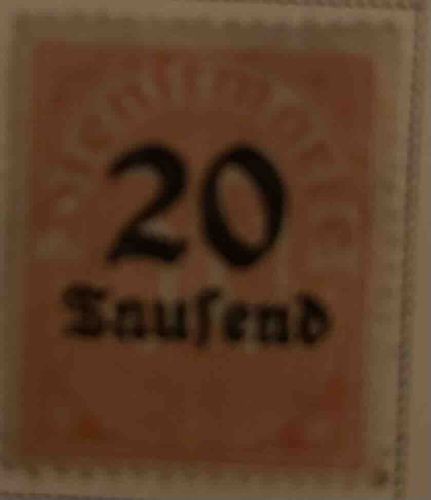
German Inflation Period Stamp - 20 Tausend (Twenty Thousand)
The item is a postage stamp, characterized by its rectangular shape and a muted reddish-brown or terracotta color. The stamp features a central design with the large black numeral '20' prominently displayed. Below the numeral '20', also in black and a Gothic or Fraktur-style typeface, is the word 'Tausend'. Above the '20', there are faint, curved lines of text or design elements, though they are not fully discernible due to the image quality. The entire stamp is surrounded by a perforated edge, typical of postal stamps designed for tearing from a sheet. The paper appears to be of standard thickness for a postage stamp of its era. Visible condition issues include a general softness of focus in the image, suggesting potential minor wear or aging of the stamp itself, or simply poor photographic resolution. No significant tears, creases, or major discolorations are strongly evident, but the overall crispness is lacking. The colors are somewhat faded, as might be expected from an item of this age. Given the denomination '20 Tausend' (Twenty Thousand), this stamp likely originates from the German hyperinflation period, which occurred roughly between 1922 and 1923, making its estimated age around 100 years old. These stamps are unique due to their extremely high, yet rapidly devaluing, face values, reflecting a turbulent historical economic period. The craftsmanship is typical of mass-produced postage stamps of the early 20th century.
AI-Generated Appraisal Disclaimer
Estimated Value
$5 - $15
Basic Information
Category
Postage Stamp
Appraised On
February 8, 2026
Estimated Value
$5 - $15
Item Description
The item is a postage stamp, characterized by its rectangular shape and a muted reddish-brown or terracotta color. The stamp features a central design with the large black numeral '20' prominently displayed. Below the numeral '20', also in black and a Gothic or Fraktur-style typeface, is the word 'Tausend'. Above the '20', there are faint, curved lines of text or design elements, though they are not fully discernible due to the image quality. The entire stamp is surrounded by a perforated edge, typical of postal stamps designed for tearing from a sheet. The paper appears to be of standard thickness for a postage stamp of its era. Visible condition issues include a general softness of focus in the image, suggesting potential minor wear or aging of the stamp itself, or simply poor photographic resolution. No significant tears, creases, or major discolorations are strongly evident, but the overall crispness is lacking. The colors are somewhat faded, as might be expected from an item of this age. Given the denomination '20 Tausend' (Twenty Thousand), this stamp likely originates from the German hyperinflation period, which occurred roughly between 1922 and 1923, making its estimated age around 100 years old. These stamps are unique due to their extremely high, yet rapidly devaluing, face values, reflecting a turbulent historical economic period. The craftsmanship is typical of mass-produced postage stamps of the early 20th century.
Related Tags
Get Your Items Appraised
Instant estimates of your treasures with AI-powered instant appraisals